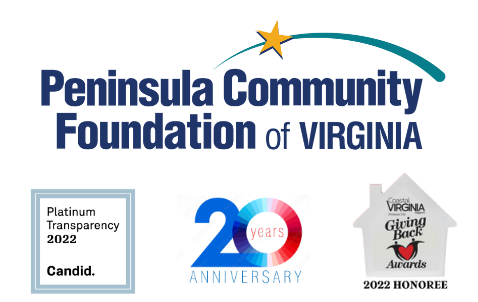happy new year from the peninsula community foundation!I want to begin this month’s newsletter by saying thank you for your wonderful support. Your generosity to our area charities is truly inspirational. Nationally, contributions to nonprofit work have seen significant reductions. Currently I don’t have a way to measure total local support for community work, but I can measure the generosity of our fund holders. Beginning in 2020 and continuing through 2023 our total grants to the nonprofit community have continued to increase. In 2023 you and the various funds we manage gave more than four million dollars to local causes! There is so much need on the Peninsula and because of your contributions, both financial and personal involvement, our area continues to prosper.
|
Many of you have been fund holders and fund advisors at the community foundation for years, and we are grateful. Some of you established a donor-advised fund, field-of-interest fund, scholarship fund, or unrestricted fund in 2023, and we’re so glad you did. Others of you are evaluating whether to start a fund at the community foundation in 2024. We are here to answer your questions, and we look forward to working together!
Here is what we’re covering in this issue:
As always, please reach out anytime!
Michael Monteith, CEO
Peninsula Community Foundation of Virginia
Here is what we’re covering in this issue:
- As you build your charitable plans for 2024, remember that you can work with the community foundation to achieve your goals for supporting favorite charities with gifts this year and also establish plans to ensure that your support for these causes continues far into the future through tax-savvy “planned giving” techniques.
- Don’t leave your loved ones in the dark. We have compiled a short list of financial and personal information you should put together to guide your family after you are gone. Be sure to include information about your donor-advised or other type of funds at the community foundation. Our team can help document your intentions.
- The new year brings new numbers! Be sure you’re up to date on the various IRS thresholds and inflation adjustments that could impact your charitable giving and tax planning through your fund or funds at the community foundation.
As always, please reach out anytime!
Michael Monteith, CEO
Peninsula Community Foundation of Virginia
planned giving pointers
|
As you’ve chatted over the years with the professionals working at your favorite nonprofits, you’ve likely heard the term “planned giving.” You may have even wondered what the term means–even if you have already structured so-called “planned gifts” to support your favorite charities!
Here are a few pointers to help break down the concept of planned giving, along with ways the community foundation can help you achieve your charitable goals. It may help to think of “planned giving” in contrast to what’s sometimes called “current” or “annual” giving. For example, when you write a check (or, ideally, give highly-appreciated stock) to a charitable organization such as your fund with us, you’re transferring those funds right away in a relatively straightforward manner. You also may be making annual gifts to several charities, and from time to time you may also make gifts to a favorite charity’s endowment or reserve fund here at the foundation. |
By contrast, a “planned gift” is more complex and forward-looking than current or annual support of your favorite charitable causes. Making structured future transfers to charity is often referred to as “planned giving” because, well, these gifts require planning. Here are examples of common “planned gifts”:
- A bequest in your will or trust allows you to name a charity or your fund at the community foundation, to receive a certain dollar amount, or a percentage of your estate, following your death. We can work with you and your advisors to include a bequest in your estate plan using the proper bequest language. Creating a fund designated to support your favorite causes is very easy and insures that your support for your community will continue forever!
- Beneficiary designations on life insurance policies, and especially on retirement plans, can be very effective tools for making bequests. We can work with you and your advisors to complete the paperwork required to properly designate your fund at the community foundation as the beneficiary of life insurance or IRA assets, including reviewing with you the many tax benefits of using retirement plans to fund your bequests.
providing guidance to loved onesWhatever their age or health status, most people are aware that they need to document important financial and personal information for loved ones, just in case the unexpected occurs. We’ve all heard stories about someone’s family member who passed away and left little, if any, information about where to find bank accounts, passwords, estate planning documents, life insurance policies, and other information. No one wants to leave their loved ones in the lurch with scant information, but it’s often hard to get motivated to write it all down in one place.
The start of a new year is an excellent time to get organized and provide your next of kin or key advisors with the information they’d need to take care of your affairs if something were to happen to you. The list of “must haves” includes the obvious: |
Will, trust, power of attorney, birth certificate and marriage license, titles to cars and boats, deeds to property, car keys, bank accounts, investments and advisor contact information, life insurance policies and contact information for the agent, funeral wishes, and, critically, passcodes and passwords to devices and accounts.
What might not be obvious, though, is that you also ought to leave your loved ones with information about your charitable giving, including details about favorite charities you’ve supported over the years and information about your donor-advised or other type of fund (or funds) at the community foundation. In many instances, one member of a family has managed a family’s or a couple’s donor-advised fund, for example, while others have not been as involved in the mechanics. Be sure to include your funds at the community foundation on your list of key information, and include the community foundation’s contact information. You might also like to include a copy of your donor-advised fund agreement outlining successor advisors, as well as login credentials to the community foundation’s online fund portal.
The team at the community foundation is happy to help you put together documentation about your donor-advised fund and charitable wishes to include with the information you provide to your loved ones so they are not completely lost as they navigate how to carry out your philanthropic wishes. Even better, we’re happy to work with you anytime to show your family members exactly how your donor-advised or other type of fund works so that they are involved and participating with you in your philanthropic pursuits during your lifetime.
Making it easy for you to share the joy of giving, and also helping ensure that family members have the information they need, are top priorities at the community foundation. We are honored to work with you to help make your philanthropy easy, effective, and rewarding for everyone involved.
What might not be obvious, though, is that you also ought to leave your loved ones with information about your charitable giving, including details about favorite charities you’ve supported over the years and information about your donor-advised or other type of fund (or funds) at the community foundation. In many instances, one member of a family has managed a family’s or a couple’s donor-advised fund, for example, while others have not been as involved in the mechanics. Be sure to include your funds at the community foundation on your list of key information, and include the community foundation’s contact information. You might also like to include a copy of your donor-advised fund agreement outlining successor advisors, as well as login credentials to the community foundation’s online fund portal.
The team at the community foundation is happy to help you put together documentation about your donor-advised fund and charitable wishes to include with the information you provide to your loved ones so they are not completely lost as they navigate how to carry out your philanthropic wishes. Even better, we’re happy to work with you anytime to show your family members exactly how your donor-advised or other type of fund works so that they are involved and participating with you in your philanthropic pursuits during your lifetime.
Making it easy for you to share the joy of giving, and also helping ensure that family members have the information they need, are top priorities at the community foundation. We are honored to work with you to help make your philanthropy easy, effective, and rewarding for everyone involved.
clean slate: tips for charitable giving in 2024A new year is such a great time to plan and reboot. Cliché as it may be to talk about resolutions this time of year, it’s tough to deny that January represents a clean slate for “to do” lists, goals, and your overall mindset.
As you think about your 2024 charitable giving goals and priorities, here are a few items to consider: You may have more capacity to give to charity. The IRS issued inflation adjustments for important thresholds such as the standard deduction, Social Security cost-of-living adjustments, annual exclusion gifts, Required Minimum Distributions, Qualified Charitable Distributions, and levels of income for each tax bracket. Talk with your advisors about how these adjustments might impact your charitable giving goals–or even create opportunities for you to do more to support your favorite causes in 2024. |
You may soon get a charitable deduction even if you do not itemize.
Many eyes are on the Charitable Act, which, if passed, would allow even non-itemizers to deduct certain charitable gifts on their income tax returns. This legislation has generated strong public support; 77% of Americans are reportedly in favor of the proposed “universal” charitable deduction.
You’ll likely still receive requests to fund disaster relief efforts.
Disaster giving is likely to remain high on the fundraising radar, meaning you will likely continue to get requests for donations to support disaster-related causes. As always, please reach out to the community foundation to strategize about effective deployment of your charitable dollars to help people who need it most in the wake of disasters and humanitarian crises.
This is a good time to review your estate plan without being rushed.
The beginning of the year is an excellent time to be sure your estate plan is in order. Many people scramble at the end of the year to execute tax planning transactions, which is understandable, but this often leaves little time for a thoughtful, strategic evaluation of the various components that make up a comprehensive estate plan, including financial planning, retirement planning, tax planning, investments and wealth management, business succession planning, planning for disability, evaluating wills and trusts as children get older and needs change, and, of course, charitable planning.
Reach out to us as you and your advisors evaluate the steps you’d like to take in 2024. We’re here to help ensure that you achieve your charitable giving goals in the most tax-savvy and impact-minded way possible so that you can continue to help the causes you care about the most.
Many eyes are on the Charitable Act, which, if passed, would allow even non-itemizers to deduct certain charitable gifts on their income tax returns. This legislation has generated strong public support; 77% of Americans are reportedly in favor of the proposed “universal” charitable deduction.
You’ll likely still receive requests to fund disaster relief efforts.
Disaster giving is likely to remain high on the fundraising radar, meaning you will likely continue to get requests for donations to support disaster-related causes. As always, please reach out to the community foundation to strategize about effective deployment of your charitable dollars to help people who need it most in the wake of disasters and humanitarian crises.
This is a good time to review your estate plan without being rushed.
The beginning of the year is an excellent time to be sure your estate plan is in order. Many people scramble at the end of the year to execute tax planning transactions, which is understandable, but this often leaves little time for a thoughtful, strategic evaluation of the various components that make up a comprehensive estate plan, including financial planning, retirement planning, tax planning, investments and wealth management, business succession planning, planning for disability, evaluating wills and trusts as children get older and needs change, and, of course, charitable planning.
Reach out to us as you and your advisors evaluate the steps you’d like to take in 2024. We’re here to help ensure that you achieve your charitable giving goals in the most tax-savvy and impact-minded way possible so that you can continue to help the causes you care about the most.
This newsletter is provided for informational purposes only. It is not intended as legal, accounting, or financial planning advice.
For more information about establishing a fund, please [email protected]/757.327.0862





